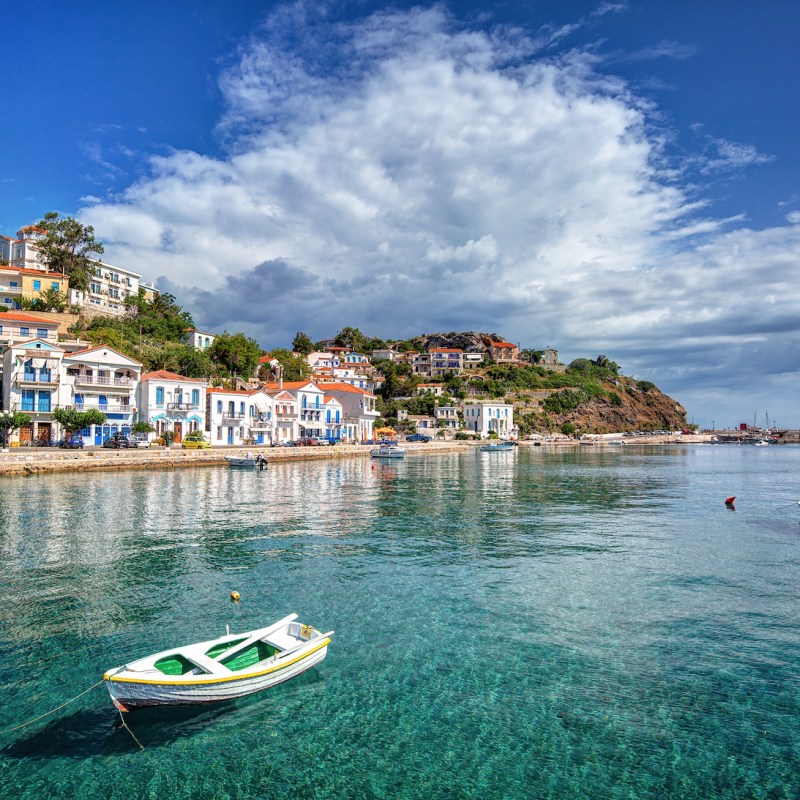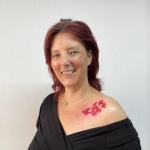
Greece has over 6,000 islands and islets scattered around its coast. Only 227 are inhabited. Some large islands have busy airports and attract a resort-style crowd. Others are too small for airports and only have ferry connections — few and far between in the winter months, meaning you’ll have a less crowded, more traditional experience. Even in the summer, they can be less packed.
Videos by TravelAwaits
Ikaria (also spelled Icaria) falls somewhere in the middle. The mountainous, 98-square-mile island in the eastern Aegean Sea has a year-round population of around 8,423, and a small domestic airport on the northeastern tip.
The island’s name stems from Greek mythology. Icarus was the son of Daedalus, a craftsman. Between them, they created the labyrinth in Crete where the monster of Knossos, the Minotaur, was kept. In order to escape Crete, Daedalus made wings from leather to fly away. Icarus was impatient and created wax wings to fly higher. His father warned him, but Icarus didn’t listen and took to the skies, flying too close to the sun and melting his wings, plunging him into the sea. Where he fell is supposed to be where the island formed.
Expect long stretches of beaches, wild landscapes, authentic people, and unique experiences that will stay with you long after you’ve left. You see, Ikaria is nicknamed “The Island Where People Forget to Die,” and it’s one of five Blue Zones in the world.

What’s A Blue Zone?
Researchers have long looked at why some parts of the world’s population live longer than others. Why do they live longer, healthier lives?
There are five blue zones, identified by writer Dan Buettner and demographers Gianni Pes and Michel Poulain as the places whose inhabitants live the longest and healthiest lives: Loma Linda in California, the Nicoya Peninsula in Costa Rica, Okinawa in Japan, the Barbagia Region of Sardinia, and the Island of Ikaria, Greece.
Blue Zones spread across the globe, yet they share some commonalities:
- Environments that encourage natural exercise
- A sense of purpose in the life of its citizenry; not a live-to-work concept
- Wide adherence to the “80 percent rule”: eating until 80 percent full to appreciate the food
- A plant-based diet featuring beans, pulses, soy, lentils, and the like; meat is eaten in smaller quantities; in Ikaria, they consume goat milk, which is high in potassium and the stress-relieving hormone tryptophan
- Quality alcohol consumption; 1–2 glasses of red wine a day on Ikaria is considered to provide balance, probably because it’s thought that Dionysus, the Greek God of Wine, was born here
- Value placed on family and a sense of belonging with friends; family look after each other well into old age, and strong social circles support each their members
Most important is the routine to shed stress. It’s known that stress leads to chronic health issues, such as gut inflammation. Blue Zone countries take steps to limit stress. Ikarians do this by napping regularly. As a person who likes to sleep, I found it reassuring to know my napping would be accepted!
Ikaria is an island that has rich traditional values, longevity, and a relaxed outlook. Let’s look at some of my favorite experiences in Ikaria, Greece, linked to the Blue Zone concept.

1. Beaches Of Ikaria
You’ll find an abundance of beautiful beaches to choose from on Ikaria; sandy, pebbly, and organized with sunbeds or hidden coves. Seychelles Beach, named for its blue waters, white sands, and white cliffs tumbling into the water, is one of the most popular, created years ago by a landslide.
Yet as I was driving my rented car away from the port of Evdilos — the temporary capital of Ikaria during the Ottoman rule of 1834–1912 — I had to pull over when I saw a swath of golden sand and small umbrellas. This was Messakti beach, one of Ikaria’s most popular. The river Myrsonas flows into it, forming a small wetland. With the small, blue-domed church of Gialiskaris jutting out to sea in the distance, this made the perfect spot to spend the day, snoozing on my sunbed and feeling sure this was lowering my stress levels.

2. Harbor And Marina Of Agios Kirykos
Neoclassical houses, flowering balconies, narrow streets with tavernas, and cafes, all built amphitheatrically around the port, await when you spend time in the island’s capital.
Agios Kirykos was founded by sailors over 300 years ago, and its port and marina make it the main gateway of the island.
It’s worth spending some time exploring this harbor. Visit the large, colorful Agios Kirykos Church, the archaeological museum housed in a room in the high school, or just sit with a Greek coffee by the waterfront, relaxing.
It’s also worth a visit for some unique traditional Ikarian products, such as honey, herbs, and olive oil in the bio store, Throubi. You’re sure to find a unique gift to take home.
3. Wine Tasting
Ikaria is reputedly the birthplace of Dionysus, God of Wine — and with Ikaria’s Blue Zone concept of healthy wine consumption, what better place than to sample the unique wines created here?
The family-owned Afianes Wines has been cultivating grapes using organic methods for over 20 years, resulting in an internationally renowned label. During your tour of the winery, you’ll have the chance to see the wine fermenting in clay jars underground, visit the winery’s stone amphitheater with magnificent countryside views, and see the granite press where the grapes are stomped by foot, the traditional way. A choice of three guided tours means you’re sure to come away with a new appreciation of this tipple.
4. Christos Raches Village
Ikaria isn’t known for its nightlife in the traditional sense. But if it’s nightlife you’re looking for, of the alternative kind, then head to Christos Raches, nicknamed “The Village That Never Sleeps.”
Strictly speaking, this isn’t true. The village, with its traditional architecture, is very quiet during the daytime, with most of its 300+ residents inside. They surface and open shops in the early evening, staying open well past midnight.
The custom dates back to pirate times. Locals wanted to make their village look uninhabited to pirates so that they’d not be invaded — they’d be less seen in the daytime. In later years, locals would work their land during the daytime and open their shops at night, allowing for two income streams. The result, nowadays, is a quaint hangover from the past and is maintained for tourist reasons.
A visit to Christos Raches persuades you to “go Greek” in respect to time, another stress-shedding exercise.
5. Women’s Cooperative Of Raches Village
Whilst in Christos Raches, be sure to pop into the Women’s Cooperative. Created roughly 13 years ago by seven women from the surrounding area, each with their own skillset to keep the venture going, its initiative is to create jobs for local people around the village by making and selling products using ingredients from raw producers on the island. Step through their door and you’ll find goodies such as jams, pastries, pickles, sweet and sour sauces, herbs, candles, and soaps, to name but a few.
Browse, have a chat with them about life in Christos Raches, then take a seat under the plane tree in the square, where their cafe will serve you a refreshing homemade orangeade or lemonade.
Their cooperative incorporates the Blue Zone values of finding a sense of belonging with friends and not living to merely work.
6. Panygirias
If there’s one thing that Greeks enjoy is a good Panygiria, which is a traditional village feast and festival that takes place in village squares throughout the country and its islands. And Ikaria is no exception.
There are several held throughout the year, mostly in the summer months, and they celebrate the patron saint of the particular village.
Panygirias can start at any time of the day and are organized by the local cultural associations. Everybody brings a local dish or two to share, not forgetting lashings of the local Ikarian wine. Benches are laid out in the square so that people can sit, eat, and catch up. There’s usually a church service, as well.
The highlight: dancing in the square with to live music, traditional songs of the island, drawing together the community regardless of age in feast and celebration.
In the past, traditional Ikarian costumes — kilts for the men and woven linen dresses for the women — were worn. You can find examples of these in the Folklore Museum in Agios Kirykos.
Yes, Ikaria may be an island, but the “no man is an island” concept is alive and kicking here. You can be alone, but never lonely on Ikaria.
7. Ikaria Longevity Retreat
Immerse yourself in the Ikaria Longevity Retreat, founded and run by two Greek women who are passionate about sharing the Blue Zone/Ikarian way with others.
Learn for yourself the secrets of Ikarian longevity, implement these into your daily life (at least for a week) and aim to carry them forward.
The week exposes you to the 5 steps to longevity, the Ikarian way. You’ll learn meditation techniques, eat a plant and fish-based diet, encourage mild movement through various water exercises, rest up with a midday siesta, and connect with each other through theatrical techniques and attending a panygiria. Other classes include cooking and wine tasting.
One thing’s for sure; you won’t want to leave.

Ikaria Pro Tips
- The summer months are the best time, usually, to visit any Greek island — especially if you’re wanting to swim in the sea. Temperatures in July and August average around 81 degrees Fahrenheit in Ikaria. August is high season, yet luckily, Ikaria doesn’t appear to have been affected by mass tourism.
- Don’t rule out September and October visits, with temperatures around 75 and 66 degrees Fahrenheit respectively. Plus peak holiday time will pretty much be over.
- Access to some of Ikaria’s beaches, such as Seychelles, can be a scramble, so be sure to take good shoes in case a walk is required.
- Other beaches, such as Messakti, are very accessible with parking by the side of the road.
- Renting a car is definitely recommended, as the island’s public transport is scant. Besides, you’re surely going to want to explore the mountain villages on your own terms. I suggest you email ahead, though, because many places may only have manual cars. Aventura, which I used, seemed to have a great selection, including four-wheel drives, in excellent condition.
- And most importantly, come to Ikaria and just “be.” Before I visited, I was told by a Greek friend of the saying that Ikarians didn’t know what crying was as they had no reason to. After my visit, I’m starting to think it’s true.
Related Reading:

